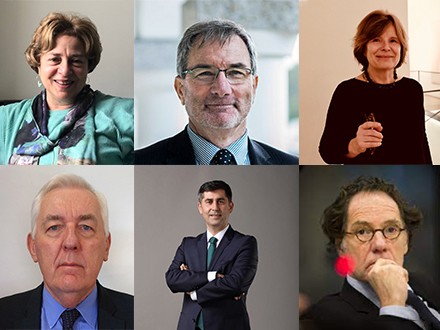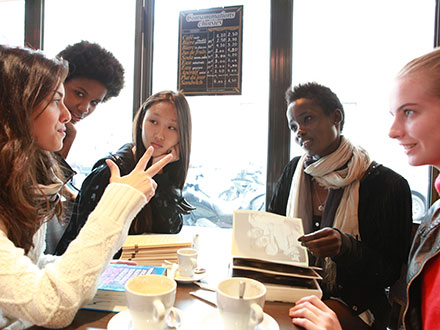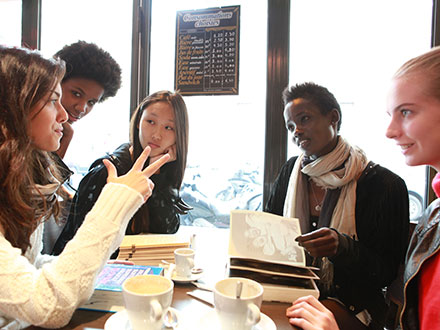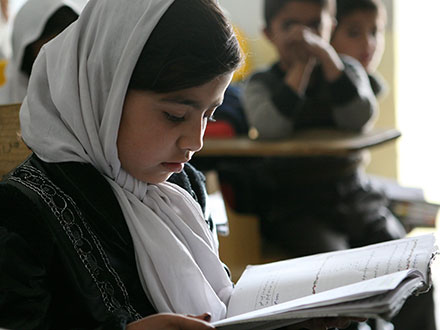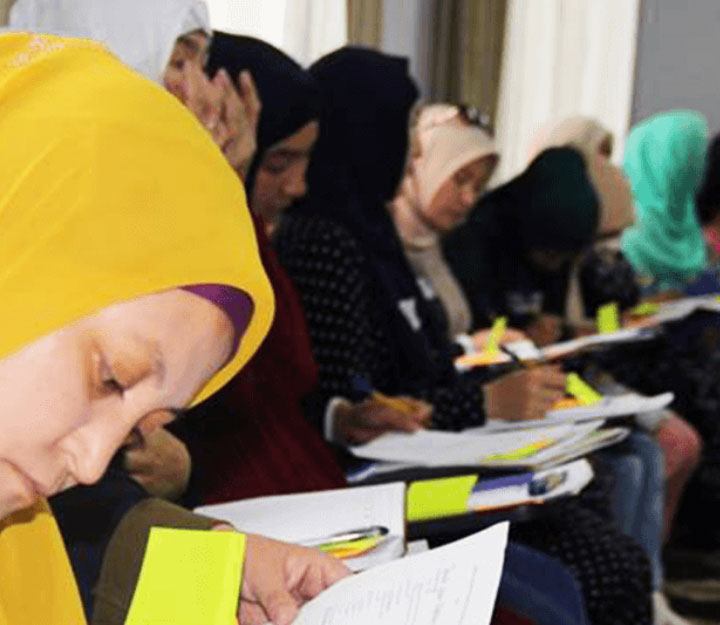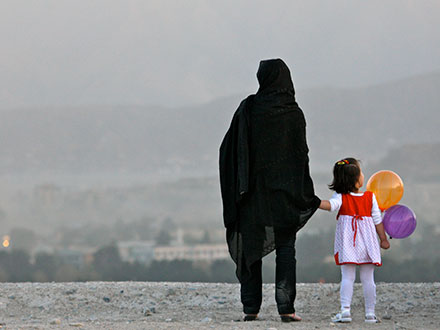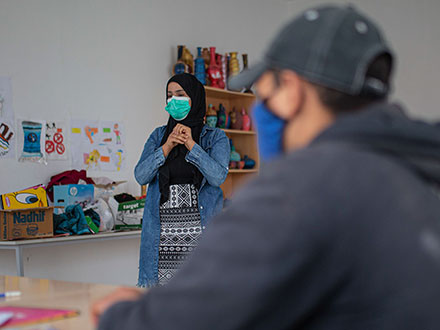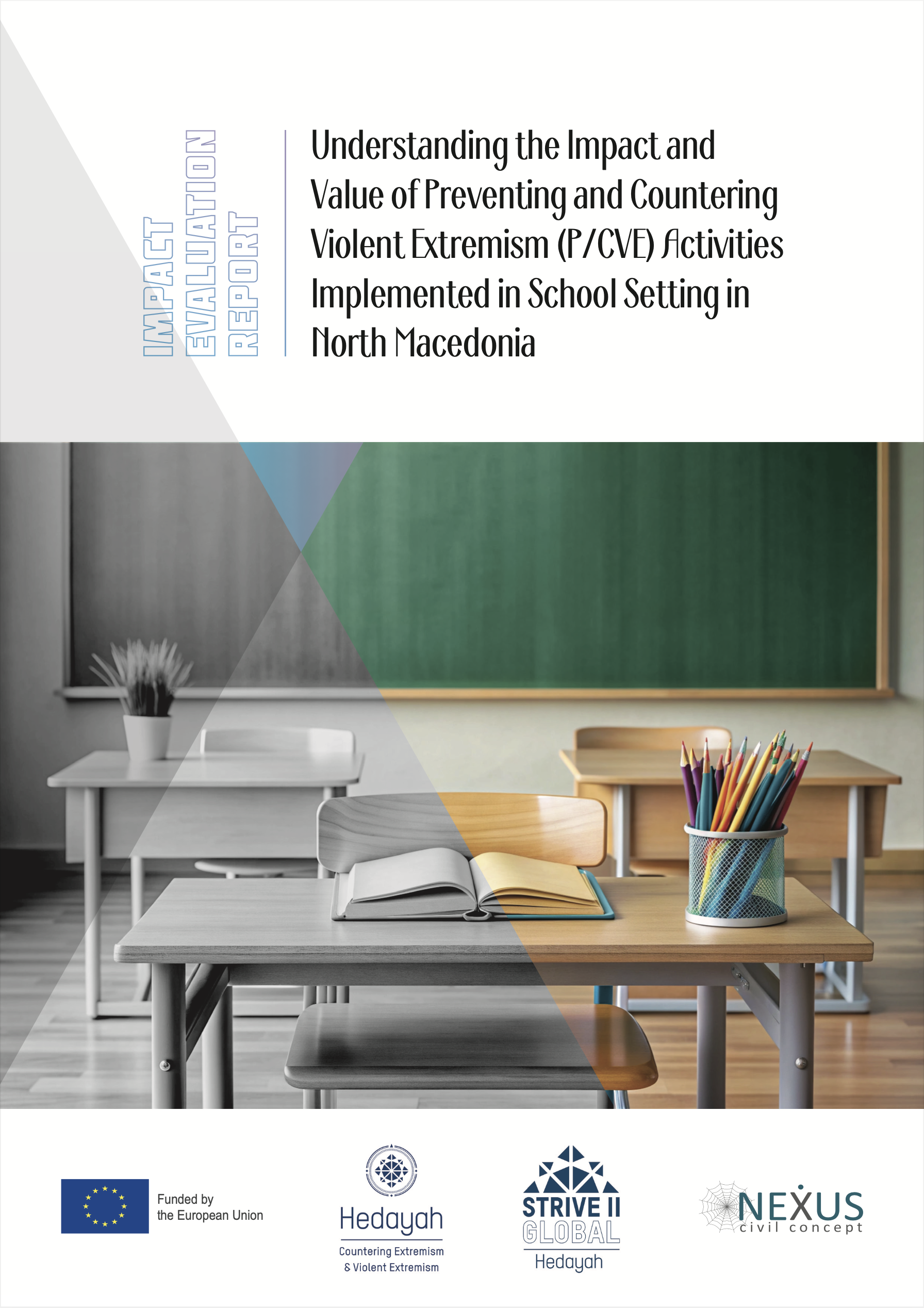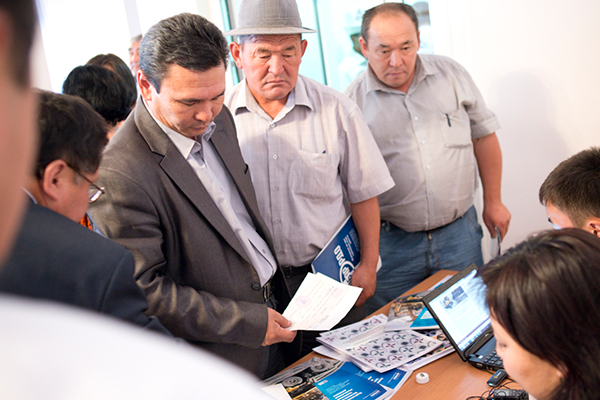STRIVE Global
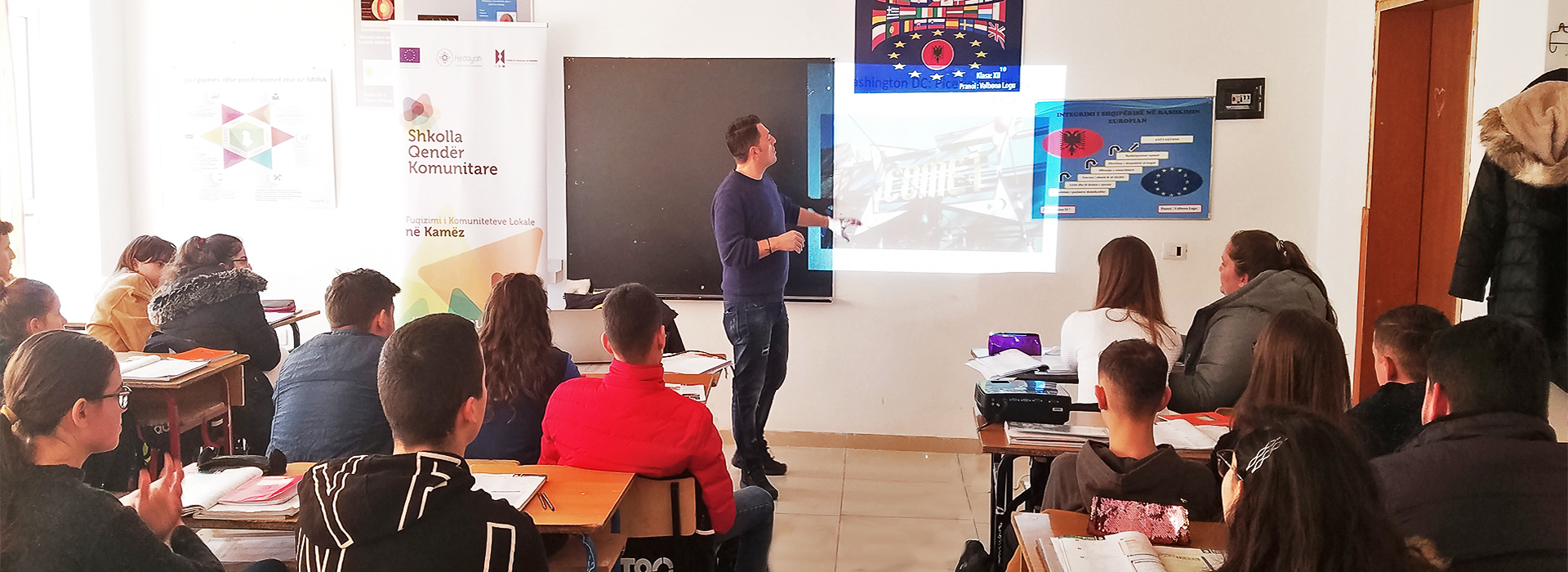
STRIVE Global assists local organizations in the design of countering violent extremism programs, research and journalism projects, and provides grants for implementation and monitoring and evaluation.
STRIVE Global assists local organizations in the design of prevention of radicalization and violent extremism, empirical social research and journalism projects, provide funds for their implementation and monitoring and evaluation -we assist local partners during the whole project cycle management-. The geographic focus is Central Asia, South Caucasus, Turkey, Western Balkans, and MENA regions. Since the program started we have supported 37 local organizations and projects in Kyrgyzstan, Tajikistan, Georgia, Turkey, Albania, Bosnia & Herzegovina, North Macedonia, Montenegro, Serbia, and Jordan.
Moreover, a CVE curriculum has been developed, in partnership with Search for Common Ground, to introduce government officials and CSOs to CVE and collaborative approaches. The curriculum has been adapted to Central Asia and MENA regions and is available in English, Russian and Arabic languages. The curriculum has been implemented in Jordan, Kyrgyzstan and Turkmenistan. Further, comprehensive online toolkits for practitioners and civil society engaged in radical right extremist counter-narrative campaigns have been created.
STRIVE Global II
STRIVE Global achieved unparalleled access, continuing into STRIVE II across Central Asia, the Middle East, the Western Balkans, and the South Caucasus.

Countering Radicalization and Violent Extremism Projects
Through 18 projects in relation to this theme, STRIVE Global effectively reached and impacted 23,000 youth and students, 1,200 school staff (including teachers, psychologists, and social workers), 1,150 family members, 52 religious leaders and 26 police officers.
This theme covered various topics and trainings from the development of media literacy curriculum, establishment of referral systems and protocols in schools and communities, raising awareness to the design and production of a video game and establishment of a national hotline.
More details about each of the projects below.
In Albania
- Empowering Local Community at Preventing any form of Violent Extremism through Multi-sectoral Prevention Measures in Kamza Municipality by the Institute for Democracy and Mediation
- Strengthening a culture of resilience and harmony in Albania by Counselling Line for Women and Girls Project
- Project Overview and Outcomes
- Baseline Study: Socio-economic Situation and Perceptions of Violent Extremism and Radicalization in the Municipalities of Pogradec, Bulqizë, Devoll, and Librazhd
- Training Manual for multi-agency cooperation in identifying and countering violent extremism
- Civic Engagement Training Manual: Youth And Women In Focus
- Website: www.violentextremism.al
- Values based Educational Activities to Build Resilience to Violent Extremism among Youth in Albania by Albanian Helsinki Committee
In Bosnia and Herzegovina
- Strengthening civil society from Bosnia and Herzegovina to recognize and monitor online threats on the social media by Jabiheu
- Website: http://prepoznaj.kingdom.ba/
In Georgia
- Early Warning and Resilience Mechanism for Youth by the Academy for Peace and Development (APD)
- Civic Education, Peace Education and Peace-building by the Centre for Training and Consultancy (CTC)
- Project Overview and Outcomes
- Curriculum for Towards a Culture of Peace:
- Module 1: The Role of Civic Education in Conflict Societies
- Module 2: Human Rights, Minority Rights and Non-Violence Action
- Module 3: Diversity: Social, Cultural and Gender Diversity
- Module 4: The Role of Civic Education in Conflict Societies
- Module 5: Citizenship and The Role of Youth in Peacebuilding
- Module 6: Models and Instruments for Teaching Common Values
- P/CVE in Georgia: Capacity Building for CSOs and Civil Servants by the Georgian Center for Strategy and Development (GCSD)
In Jordan
- Improving Social and Emotional Skills through Arts in Jordan by The National Centre for Culture and Art/King Hussein Foundation
- Project Overview and Outcomes
- Theater performance “Bus Stop”
In Kyrgyzstan
- Follow Your Dream by Youth of Osh
- Supporting Youth Resilience to Online Propaganda of Violent Extremism in Kyrgyzstan by the Public Foundation Civil Initiative on Internet Policy (CIIP)
- Project Overview and Outcomes
- Media literacy modules
- Four video narratives produced:
- Countering Radicalization among Women in Jalal-Abad and Chui Oblasts by Progressive Public Association of Women – Mutakallim
- Project Overview and Outcomes
- Guide: Identifying Signs of Vulnerability Leading to Deviant Behavior, including Radicalization in Local Communities in Kyrgyzstan
- A Guide to Responding to the Challenges of Religious Radicalization in Local Communities in Kyrgyzstan
- Survey Findings Report: Sociological Survey “Determining the Level of Knowledge About Radicalization and Violent Extremism among Women and Youth“
- Training Module: Materials of the Training on Increasing the Leadership Potential of Muslim Women of Chui and Jalal-abad Oblasts of KR
- Training Module: Countering Radicalization among Women in Jalal-abad and Chui Oblasts
In North Macedonia
- Game for Change -Serious Game- Educational Tool for Strengthening Community Resilience by the Centre for Social Innovations (Blink 42-21)
- Educate to Prevent – Strengthening Front-line school Workers and Parents to Build Youth Resilience to Violent Extremism by the Center for Research and Policy Making
- Project Overview and Outcomes
- Baseline Study: Perceptions of Front-line School Workers and Community Officials from Skopje, Kumanovo, Tetovo ad Gostivar on Radicalization Leading to Violent Extremism
- Research Report: Educate to Prevent
- Handbook for Teachers in Secondary Schools and Tools for Early Detection and Action – Recognize, Prevent, Act in English and Macedonian
- Referral Model to Prevent from Radicalization
- Passage4Prevent: Use of education to prevent youth online radicalization by Centre for Research and Policy Making (CRPM)
- Guidebook: Operationalization of the Passage4Prevent Referral Mechanism in North Macedonia: From structure to agency
- Passage4Prevent Referral Model to Prevent from Radicalization
In Serbia
- Promoting Tolerance All Together in Sandzak by Helsinki Committee
- Project Overview and Outcomes
- UNESCO’s Teacher’s Guide on the Prevention of Violent Extremism, available in Bosnian, Croatian and Serbian
- Watch the theater play:
- Youth for Change: Building the resilience of Serbian youth through engagement, leadership and development of their cognitive and social-emotional skills by Psychosocial Innovation Network (PIN)
- Project Overview and Outcomes
- Research report: Results of a baseline study
- Psycho-educational workshop’s program ‘Building Youth Resilience to Violent Extremism’ program: Handbook for facilitators
- Online training program on youth leadership
- Effectiveness of the Building Youth Resilience to Radicalization and Violent Extremism: Endline study
- Youth for Change: Building the resilience of Serbian youth; Conclusions and Lessons Learned report
- Research article: Contextual and Psychological Predictors of Militant Extremist Mindset in Youth, available in Frontiers
- Psychoeducational Workshop Program and Handbook for facilitators
- Youth Leadership program curriculum
In Tajikistan
- Strengthening youth resilience to VE through a positive youth development curriculum (PYD) by Eurasia Foundation for Central Asia (EFCA)
- Cross-Sectoral Collaboration to Prevent Online and Offline Radicalization: Pilot project in Rasht Valley by Marifatnoki
- Project Overview and Outcomes

Media and Journalism Projects
Through seven projects in relation to this theme, STRIVE Global effectively trained and impacted 371 journalists, 295 students of journalism and 134 government spokespeople in seven countries.
This theme covered various topics and trainings from the development of a curriculum on reporting violent extremism and terrorism, improvement of cooperation between governments and the media through guidelines and protocols, enhancement of the quality of reporting through improvement of journalistic code of ethics to the deconstruction of fake news.
More details about each of the projects below.
In Albania
- Media and Government in Albania vs. Violent Extremism and Terrorism by the Albanian Media Institute
- Media Coverage of Violent Extremism and Terrorism: An Assessment of the Needs of Journalists, Journalism Students, and Spokespersons of Public Institutions of Albania – available on The Counter Extremism Hub in English and Albanian
In Bosnia and Herzegovina
- From data and information to responsible reporting on violent extremism and terrorism by the Balkan Investigative Reporting Network-BIRN
- Regional Terrorism and Foreign Fighters database
- Baseline study of trials:
- Bosnian https://bit.ly/3qu3dch
- English https://bit.ly/2Zqu6C6
- Macedonian https://bit.ly/3u1xwJD
- Albanian https://bit.ly/3pulyV4
- Handbook Based on the Practice and Experience of Balkan Investigative Reporting Network Journalists, available in Bosnian and English
- Webinar for professional journalists and students of journalism: https://bit.ly/3nsQm9n
- Explanatory videos for investigative journalism guidelines:
- Analytical reporting https://youtu.be/FActjPlxZ-c
- Reporting about kids https://youtu.be/IY4YrnU109g
- Reporting on victims of terrorism https://youtu.be/4VkI5xJLl48
- Classification of the act https://youtu.be/M5tkzXWbqy4
- Usage of videos and photos https://youtu.be/L8jBxzIjais
In Georgia
- Prevention and Responding to Radicalizing Narratives by the Media Development Foundation (MDF)
- Translation of the UNESCO Manual into the Georgian language: Terrorism and the Media. A Handbook for Journalists
- Prevention of and Responding to Radicalizing Narratives by the Media Development Foundation
- Report: Reporting Crises: Needs Assessment Survey
- Webinar for students of journalism: Russia and the Western Far Rights: Tango Noir by Anton Shekhovtsov, Professor of Vienna University:
In Jordan
- Improving Jordan’s Media Capacity to Counter Violent Extremism and terrorism: Media Literacy and Performance & Content Quality Perspective by Jordan Media Institute
In North Macedonia
- Building Resilience against Violent Extremism and Terrorism through Reinforced Journalists, Media and Government Officials by the Association of Journalists of Macedonia (AJM)
In Serbia
- Enhancement of Media Reporting on Violent Extremism and Terrorism by the Novi Sad School of Journalism
- Hate Speech and Stereotyping in Traditional and New Media
- Handbook for journalists: Media Coverage of Violent Extremism and Terrorism
In Tajikistan
- Strengthening the resilience of media and government spokespersons to communicate on violent extremism and terrorism in Tajikistan by Public Fund Civil Internet Policy Initiative (CIPI)
The following presents the STRIVE Global program’s key resources, articles, platforms and research:
Interactive CVE Platforms
Research Papers
- Coverage of Muslim related topics in Georgian, Russian, Azerbaijani and Turkish traditional and new media by Media Development Foundation (MDF)
- Survey on needs, information and communication sources of Muslim Youth in Georgia by Media Development Foundation (MDF)
- Attitudes of Muslim Youth towards Media Coverage and Offensive Language by Media Development Foundation (MDF)
- Study of Vulnerability towards Violent Extremism in Youth of Georgia by the Institute for Social Studies and Analysis (ISSA) – available on The Counter Extremism Hub
- Impact of media on CVE in Montenegro by NOMEN – available on The Counter Extremism Hub
- Religion and Doctrine: Ideological Roots and Causes of Radicalization in Albania by Albanian Institute for International Studies – available on The Counter Extremism Hub
- Research on the Role of Educational Institutions in Building Resilience of Adolescents to Radicalisation and Violent Extremism in the Kyrgyz Republicby EFCA
- Analytic Note: Study of the Role of Educational Institutions in Improving the Resilience of Adolescents to Radicalization and Violent Extremism in the Kyrgyz Republic by EFCA
- Travelers to Syria: A Criminological and Security Analysis with Special Focus on Returnees from Syrian Battlefronts by the Faculty of Criminalistics, Criminology and Security Studies (Bosnia and Herzegovina)
- Enhancing the Understanding of FTF: Challenges for Rehabilitation, Resocialization and Reintegration of Returnees in the Republic of North Macedonia by the NEXUS Civil Concept and Institute for Human Rights
- Contextual and Psychological Predictors of Militant Extremist Mindset in Youth by Frontiers in Psychology
- Examining Gendered Components of Radicalization and Violent Extremism in Albania by Woman Center for Development and Culture
- Why We Went to Fight and Why We Returned: Radicalisation and Deradicalisation – Learning from Foreign Terrorist Fighters by the Research Centre of Religious Studies
- Exploring the Development of a Strategic Communication on P/CVE in Albania by the Center for the Study of Democracy and Governance
STRIVE Global In Focus
- Preventing Violent Extremism in Jordan through Interactive Theater Performances
- Serious Games as a Tool to Tackle Youth Radicalization
- Deconstructing Fake News and Raising Media Literacy in Serbia
- The Use of Psychoeducational Training to Prevent Radicalization leading to Violent Extremism
- Hedayah Presents The STRIVE Global Program
The Radical Right Counter-Narratives Project
This a year-long project implemented with the Centre for Analysis of the Radical Right. The overall project creates one of the first comprehensive online toolkits for practitioners and civil society engaged in radical right extremist counter-narrative campaigns.
It also maps the narratives in nine countries and regions, including Australia, Canada, Germany, Hungary, New Zealand, Norway, United Kingdom, and the United States.
- Building a Successful Radical Right Counter-Narrative: A How-To Guide
- From Street-based Activism to Terrorism and Political Violence: UK Radical Right Narratives and Counter-Narratives at a Time of Transition
- From Direct Action to Terrorism: Canadian Radical Right Narratives and Counter-Narratives at a Time of Volatility
- Tackling Hate in the Homeland: US Radical Right Narratives and Counter-Narratives at a Time of Renewed Threat
- Australian Radical Right Narratives and Counter-Narratives in an Age of Terrorism
- From Gangs to Groupuscules and Solo-Actor Terrorism: New Zealand Radical Right Narratives and Counter-Narratives in the Context of the Christchurch Attack
- Bringing Back the Golden Age: Hungarian Radical Right Narratives and Counter-narratives in Light of Historical Revisionism
- Radical Right Narratives and Norwegian Counter-Narratives in the Decade of Utøya and Bærum Solo-Actor Attacks
- A Movement between Parliamentary Politics and the Pathway to Violence and Terrorism: Germany’s Radical Right Narratives and Counter-Narratives



